Tuesday, October 31, 2006
Cheney Criticizes Sarbanes-Oxley
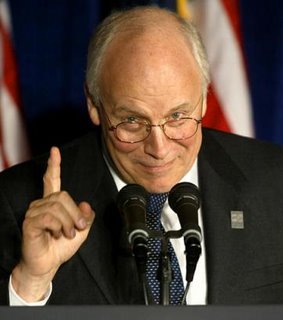
Cheney is obviously getting ready for his (overt) return to the corporate world.
Vice President Dick Cheney suggested Monday he wouldn't support new hedge-fund regulation and said the Sarbanes-Oxley law passed four years ago may have gone "too far" in safeguarding investors from corporate fraud.
"I'm reluctant to see additional regulation," Cheney said in an interview with CNBC television, when asked about hedge funds and corporate ethics. "We have to be very careful about slapping on new regulations or trying to respond to the political pressures of the moment by making life even more burdensome than we have."
The Treasury Department is leading a task force that is examining the impact of hedge funds on financial markets. The inquiry also involves the Securities and Exchange Commission, the Federal Reserve and the Commodity Futures Trading Commission.
Cheney said the Bush administration would "be happy to work with" Democrats on changing Sarbanes-Oxley, a law passed in 2002 that imposes stiffer penalties on companies for committing fraud.
"I do think there needs to be some work done in that area," Cheney said. "You can make a case that Sarbanes-Oxley went too far."
Pressure to regulate the industry has intensified since the collapse last month of Amaranth Advisors LLC of Greenwich, Conn., which lost $6.6 billion -- the most ever by a hedge fund -- because of bets on natural gas.
Monday, October 30, 2006
Another Gooper Prediction Of Voting Problems
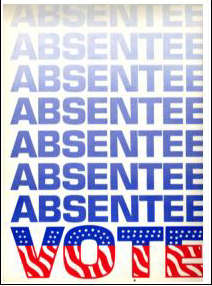
Continuing yesterday's theme of pre-emptive GOP bitching about the mechanics of the midterm voting, John Fund of the Wall Street Journal today comments that the American people may have to wait some time to find out who has prevailed this time at the polls.
The culprits, according to Fund, are the absentee ballots:
If control of Congress hinges on a few close races, don't expect to know the final outcome on Election Night. While early votes cast on electronic machines are easily integrated into the totals from traditional polling places, paper absentee ballots are typically counted only after the others. In Florida, Pennsylvania and some other states, ballots will come in for days because they are legal if postmarked on or before Election Day. Provisional votes, which are cast when a voter doesn't show up on registration rolls, can also slow down the process. Generally, officials have up to 14 days to determine if a vote is valid. Maryland officials barely met that deadline after snafus with electronic voting machines dramatically increased the number of provisional votes cast in its primary last month.
In some supertight races, a flood of absentee ballots could delay the results for weeks. "Anytime you have more paper ballots cast outside polling places, the more mistakes and delays you're likely to have," Bill Gardner, New Hampshire's Democratic secretary of state, told me.
The Republicans are laying the groundwork necessary to prepare the nation for a post election fight over the legitimacy of the results.
Sunday, October 29, 2006
New Right Wing Focus on Electronic Voting Skullduggery

Key GOP mouthpieces such as Charles Krauthammer and George Will have begun to complain about the fallibility of electronic voting technology.
They appear to be getting their ducks in a row to explain any Democratic landslide in the midterms as electronic voting skullduggery.
Today comes revelations about U.S. suspicions that America's bogeyman -- Hugo Chavez -- has covertly purchased a major manufacturer of electronic voting machines.
The federal government is investigating the takeover last year of a leading American manufacturer of electronic voting systems by a small software company that has been linked to the leftist Venezuelan government of President Hugo Chavez.
The inquiry is focusing on the Venezuelan owners of the software company, the Smartmatic Corporation, and is trying to determine whether the government in Caracas has any control or influence over the firm's operations, government officials and others familiar with the investigation said.
The inquiry on the eve of the midterm elections is being conducted by the Committee on Foreign Investment in the United States, or CFIUS, the same panel of 12 government agencies that reviewed the abortive attempt by a company in Dubai to take over operations at six American ports earlier this year.
I can see where this is heading.
Saturday, October 28, 2006
This Time Of Year Brings Out The Best In People
I.R.S. Going Slow Before Election
The commissioner of internal revenue has ordered his agency to delay collecting back taxes from Hurricane Katrina victims until after the Nov. 7 elections and the holiday season, saying he did so in part to avoid negative publicity.
The commissioner, Mark W. Everson, who has close ties to the White House, said in an interview that postponing collections until after the midterm elections, along with postponing notices to people who failed to file tax returns, was a routine effort to avoid casting the Internal Revenue Service in a bad light.
"We are very sensitive to political perceptions," Mr. Everson said Wednesday, adding that he regularly discussed with his senior staff members when to take actions and make announcements in light of whether they would annoy a powerful member of Congress or get lost in the flow of news.
The tax agency has broad discretion to change filing deadlines in the case of disasters and has traditionally eased off tax collections before the December holidays.
But four former I.R.S. commissioners, who served under presidents of both parties, said that doing so because of an election was improper and indefensible.
Friday, October 27, 2006
Preliminaries in Libby's Court Battle Begin

With withering and methodical dispatch, White House nemesis and prosecutor Patrick J. Fitzgerald yesterday sliced up the first person called to the stand on behalf of the vice president's former chief of staff.
If I. Lewis "Scooter" Libby was not afraid of the special counsel before, the former Cheney aide, who will face Fitzgerald in a trial beginning Jan. 11, had ample reason to start quaking after yesterday's Ginsu-like legal performance.
Fitzgerald's target in the witness box was Elizabeth F. Loftus, a professor of criminology and psychology at the University of California at Irvine. For more than an hour of the pretrial hearing, Loftus calmly explained to Judge Reggie B. Walton her three decades of expertise in human memory and witness testimony. Loftus asserted that, after copious scientific research, she has found that many potential jurors do not understand the limits of memory and that Libby should be allowed to call an expert to make that clear to them.
But when Fitzgerald got his chance to cross-examine Loftus about her findings, he had her stuttering to explain her own writings and backpedaling from her earlier assertions. Citing several of her publications, footnotes and the work of her peers, Fitzgerald got Loftus to acknowledge that the methodology she had used at times in her long academic career was not that scientific, that her conclusions about memory were conflicting, and that she had exaggerated a figure and a statement from her survey of D.C. jurors that favored the defense.
Her defense-paid visit to the federal court was crucial because Libby is relying on the "memory defense" against Fitzgerald's charges that he obstructed justice and lied to investigators about his role in the leaking of a CIA operative's identity to the media. Libby's attorneys argue that he did not lie -- that he was just really busy with national security matters and forgot some of his conversations.
When Fitzgerald found a line in one of her books that raised doubts about research she had cited on the stand as proof that Libby needs an expert to educate jurors, Loftus said, "I don't know how I let that line slip by." ...
There were several moments when Loftus was completely caught off guard by Fitzgerald, creating some very awkward silences in the courtroom.
One of those moments came when Loftus insisted that she had never met Fitzgerald. He then reminded her that he had cross-examined her before, when she was an expert defense witness and he was a prosecutor in the U.S. attorney's office in New York.
Libby's defense team declined to comment.
Thursday, October 26, 2006
Loaves and Fishes/ Holy Ghost Scenario
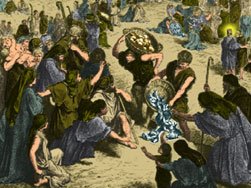
Bob Fitrakis & Harvey Wasserman give a timely warning of specific malfeasance that could be looming for the midterms.
It will take just two Biblical fixes for the GOP to keep the Congress, and thus solidify their power in this country, possibly forever: a loaves and fishes vote count, a Holy Ghost turnout.
We coined the phrase "loaves and fishes vote count" to describe the tally in Gahanna, Ohio, 2004. This infamous precinct in suburban Columbus registered 4258 votes for George W. Bush where just 638 people voted. The blessed event occurred at a fundamentalist church run by a close ally of the Reverend Jerry Falwell.
These numbers were later "corrected." But they reflect a much larger reality: the 2004 election was stolen with scores of dirty tricks for whose second coming the Democrats have yet to fully prepare. ...
Which is brings us to the Holy Ghost turnout. As Robert F. Kennedy, Jr., has reported in Rolling Stone Magazine, in Georgia 2002, U.S. Senate incumbent Max Cleland went into Election Day with a very substantial lead in the polls. He proceeded to allegedly lose by a substantial margin. Church-state operatives like Ralph Reed attributed this astonishing turn-around to an alleged last-minute mass turnout of evangelical voters.
Similar things were said about Florida and Ohio 2004.
But it never happened. There are no visual reports or other reliable indicators of extraordinary lines or massive late-in-the-day crowds at the polls. Throughout all those election days, it was every bit as quick and easy to vote in rural precincts that gave Bush his miraculous victory as it was impossible to do so in your average black neighborhood. But there was no extraordinary turnout of last-minute Bush voters.
What happened instead harkens to the Holy Ghost, made manifest in electronic voting machines that cannot and will not be monitored. The miraculous pro-Bush margins give new meaning to the phrase "ghost in the machine." While the Democratic vote count was slashed and trashed in urban precincts, the rural voting stations, through the miracle of untrackable electronics, materialized just the right number of GOP votes to keep the Men of God in the White House (where it's recently reported they dare to mock those earthly evangelicals who allegedly gave them their margin of victory).
There's absolutely nothing to prevent this from happening again in 2006. Major studies from the Conyers Committee, the Government Accountability Office, Princeton University, the Brennan Center, the Carter-Baker Commission, and esteemed others, have all come to the same conclusion: it takes just one individual with inside access--or even just a wi-fi machine--to change the outcome of any election anywhere.
Electronic voting machines can be pre-programmed, re-programmed, re-calibrated, electronically adjusted, hacked, jimmied, jammed or otherwise blessed with a few well-placed electrons and---LO AND BEHOLD!---a Democratic landslide can be born again to a Republican deliverance.
We already see the signs. The corporate bloviators predict a last-minute surge for Bush. The Fox/Rove media machine has planted suggestive stories at the New York Times and elsewhere about the alleged hidden powers of the GOP juggernaut. They will, they say, once again turn out those invisible legions of evangelical voters when and where necessary.
Every two years, Rove leaks some story that is implausible and easily refuted: four million new evangelical voters are identified nationwide; or, a late surge of homophobic Old Order Amish rush to the polls in Ohio; or shy and reluctant right-wing Republican women flood the polls at closing and slip out unseen without speaking to exit pollsters (but, they are only shy in the early evening in Republican counties).
And the Democrats? They say they are also turning out voters. But what happens when their names are miraculously gone from the new electronic registration rolls? When there aren't enough machines in their precincts on which to vote? When they press a Democratic name on their touch-screen and an anointed Republican's lights up? Or when techno-gods from private partisan vendors barge in unchallenged to "adjust" the e-machines in the middle of the voting process.
So far, the Democrats have heaped abuse on those who dare to warn of all this.
Wednesday, October 25, 2006
Feds Looking At Arizona Republican

The New York Times is quoting law enforcement sources that say yet another GOP lawmaker is under scrutiny from federal investigators.
Federal authorities in Arizona have opened an inquiry into whether Representative Rick Renzi introduced legislation that benefited a military contractor that employs his father, law enforcement officials said Tuesday.
The officials said the inquiry was at an early stage and that no search warrants had been issued, suggesting that investigators had yet to determine whether there was a basis to open a formal investigation or empanel a grand jury.
Mr. Renzi, 48, a Republican who represents the First Congressional District, is a former insurance executive and real estate investor who was first elected in 2002. Almost from the start, he has been a target of citizen watchdog groups who have accused him of ethical laxity in office.
Law enforcement officials said that the most serious accusation involved Mr. Renzi's sponsorship of legislation in 2003 that appeared to indirectly benefit the ManTech International Corporation, a communications company based in Virginia that employs Mr. Renzi's father, Eugene, a retired Army general, as executive vice president. ...
Mr. Renzi's legislation, which was signed into law in November 2003, exempted the Fort Huachuca Army base in Arizona from maintaining water levels in the nearby San Pedro River, as base officials had agreed in a 2002 deal with the United States Fish and Wildlife Service. Environmentalists criticized Mr. Renzi's measure, saying it threatened water levels in one of the last undammed rivers in the West and would benefit private contractors like ManTech that operated at the base and relied on its continued operation.
ManTech has more than $450 million in military contracts at the base, which include classified military work, as well as options for more than $1.1 billion in additional contracts, according to news reports about Mr. Renzi's legislation. Employees of the company were the largest contributors to Mr. Renzi's campaign in 2002 and the second-largest in 2004.
Groups like Citizens for Responsibility and Ethics in Washington have raised additional questions about Mr. Renzi, like his employment of a top staff member in December 2005 who continued to operate a fund-raising consulting business while she worked for Mr. Renzi. House ethics rules limit outside earned income to less than $25,000 a year.
Hastert Goes Before Ethics Committee
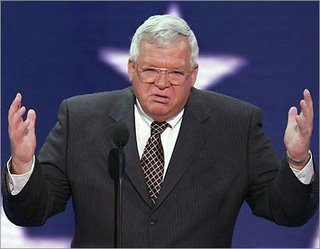
Dennis Hastert had his chance yesterday to straighten out the House Ethics Committee, who has heard much testimony about the Speaker's actions in the Mark Foley scandal.
House Speaker J. Dennis Hastert (R-Ill.) spent nearly three hours behind closed doors with the House ethics committee yesterday, describing what he knew about then-Rep. Mark Foley's relationships with young male pages and when he knew it.
The extraordinary appearance came just a few hours after the House Republican campaign chief, Rep. Thomas M. Reynolds (N.Y.), went before the committee to reiterate his contention that he personally told Hastert in the spring about suspicious e-mails that Foley had sent to a Louisiana teenager. Hastert has said he has no recollection of that conversation and did not learn of the Foley matter until it surfaced in late September. ...
House Majority Leader John A. Boehner (R-Ohio) testified last week that he also told Hastert in the spring about concerns stemming from what House leaders have termed "over-friendly" e-mails from Foley to the former page from Louisiana.
Yesterday's drama was the strongest indication yet that the House Committee on Standards of Official Conduct, as the ethics committee is formally known, may be nearing the end of its investigative work. The committee interviewed Hastert's chief of staff, Scott Palmer, on Monday and could call up his deputy chief of staff, Mike Stokke, and his counsel, Ted Van Der Meid, this week. ...
Hastert tried to deflect attention from GOP leaders yesterday, suggesting, as other Republicans have, that Democrats may have known about Foley's explicit instant messages but did not report them to authorities. Instead, Republicans have said, Democrats shopped them to the news media before the elections.
Tuesday, October 24, 2006
Hastert Chief Of Staff Testifies Before Ethics Committee
It looks like Palmer is still sticking to his story.
The congressional investigation of the Mark Foley page scandal reached into the House's highest office yesterday, as the chief of staff to Speaker J. Dennis Hastert (R-Ill.) spent more than six hours testifying to a House ethics subcommittee.
Scott Palmer, Hastert's top aide for nearly two decades, is central to the inquiry: A key witness has said he told Palmer a few years ago that Foley was showing inappropriate interest in teenagers working as House pages. Foley (R-Fla.) resigned his seat Sept. 29 after ABC News confronted him with sexually graphic electronic messages he had exchanged with former pages.
Palmer, 55, has said the account told by Kirk Fordham, who was Foley's chief of staff, "did not happen."
Last night, as Palmer and his attorney, Scott Fredericksen, left the office of the House Committee on Standards of Official Conduct, Fredericksen said his client's testimony was "consistent with the position he's taken all along." ...
Fordham, who met with the ethics subcommittee on Oct. 12, has said he went to Palmer with a different concern involving Foley and pages. Repeatedly unable to dissuade Foley from showing inordinate attention to pages, Fordham said, he appealed to Palmer to use his substantial influence to change the Florida lawmaker's behavior. Fordham said Palmer later told him that he had spoken with Foley about the problem and informed Hastert.
Palmer, in a brief statement earlier this month, disputed Fordham's account. He has made no public comments since. ...
The bipartisan ethics subcommittee spent yesterday morning questioning Sally Vastola, executive director of the National Republican Congressional Committee and a longtime top aide to Reynolds. Reynolds, who chairs the NRCC and faces a tough reelection battle in Upstate New York, is expected to meet with the subcommittee today.
Monday, October 23, 2006
Lieberman Campaign Petty Cash Skullduggery?
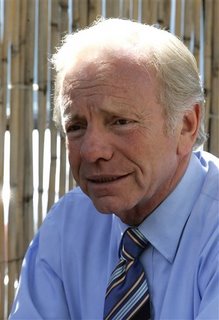
Nearly four hundred grand in cash can go pretty far, even in Connecticut.
Ned Lamont's campaign says Sen. Joseph I. Lieberman (D-Conn.) has failed to account for $387,000 in petty cash his campaign spent days before the state's Democratic primary in August.
"Whenever this much cash is floating around, it certainly raises suspicions of possible vote-buying and other potentially illegal activities that the Lieberman campaign must answer," said Liz Dupont-Diehl, a Lamont spokeswoman.
The Lieberman camp denied any wrongdoing. Spokeswoman Tammy Sun said the cash was paid to field coordinators who then distributed money to canvassing workers.
Saturday, October 21, 2006
Weldon Allegedly Tries To Keep National Security Professionals From Supporting Sestak

Citizens for Responsibility and Ethics in Washington (CREW) has copies of e-mails indicating the Rep. Curt Weldon's office has a program to intimidate supporters of his opponent in the midterm elections.
E-mails received by CREW have prompted us to ask the Department of Justice to investigate whether Congressman Curt Weldon (R-PA) violated the law by intimidating government personnel "in the national security field" who support his opponent, Joe Sestak.
The first e-mail describes a "hit list" compiled of Weldon opponent's supporters. In addition, that e-mail notes the Weldon said something to the effect of "If they don't think there will be retribution before or after the election, they're kidding themselves." The second e-mail states that Weldon had his staff contact Navy personnel to get information on Sestak.
CREW has asked the Department of Justice to investigate this very serious matter. The e-mails, which are provided below, detail a disturbing, and potentially unlawful, abuse of power. 18 U.S.C. 600 and 18 U.S.C. 610 are implicated with this kind of behavior.
Melanie Sloan stated that, "Not only has Rep. Weldon abused his position to financially benefit his daughter, he has threatened to misuse his position to punish those who support his political opponent. Rep. Weldon needs to learn that no one, not even a powerful member of Congress is above the law."
Friday, October 20, 2006
Democrats Make Gains In Fundraising

Some big money people have begun to think that the Democrats may make real inroads in the midterms. And are spreading the largesse accordingly.
Democratic fundraising for the midterm elections is ending with a surge.
In September, the Democratic campaign committees for the House and the Senate outraised their counterpart Republican committees, reversing historical trends.
The Democratic Congressional Campaign Committee raised $14.4 million and the Democratic Senatorial Campaign Committee collected $13.6 million last month, they said. In contrast, the National Republican Congressional Committee raised $12 million and the National Republican Senatorial Committee collected $5.2 million.
The Republican National Committee, however, continued to outpace the Democratic National Committee. In September, the RNC raised $13.1 million and reported total receipts of $14.3 million, while the DNC said it collected $5.6 million.
The GOP committees maintained an overall advantage of about $10 million in funds available to be spent. At the end of September, the Democratic committees had $67.3 million on hand; the Republican committees had $77.4 million.
"The Republicans' extra $10 million is better than being behind," said Michael J. Malbin, executive director of the nonpartisan Campaign Finance Institute. "But it may not be enough if you're playing defense, which Republicans are."
Thursday, October 19, 2006
Boehner Testifies in Foley Case
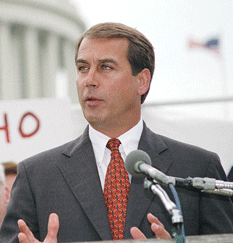
Boehner has gotten his story straight enough to take it before the House panel investigating the "Pagegate" matter.
House Majority Leader John Boehner testified before the House ethics committee Thursday, indicating afterward that he repeated his statements that he had told Speaker Dennis Hastert of Rep. Mark Foley's overly friendly e-mails to a former male page.
Boehner, R-Ohio, would not say what he specifically told the committee behind closed doors, but has publicly quoted Hastert as telling him the complaint "had been taken care of."
Also, the committee heard another important witness today:
(Former clerk of the House) Jeff Trandahl did not answer reporters' questions as he left the panel's offices after several hours of testimony. His appearance was central to the case, though, since he shouldered day-to-day responsibility for the page program and had confronted Foley last fall about inappropriate e-mails.
"Jeff Trandahl has cooperated fully with the investigation being conducted by the FBI and the ... Committee on Standards. He answered every question asked of him, and stands ready to render additional assistance if needed," Trandahl's attorney, Como Namorato, said in a statement.
Namorato said that Trandahl would not comment while the investigation in ongoing.
At issue in the ethics committee investigation is how the office of House Speaker Dennis Hastert, R-Ill., dealt with the knowledge that Foley, a Florida Republican, was sending inappropriate e-mails to teenage congressional pages. The answers could affect not just Hastert but the prospects for control of the House when voters cast ballots in the Nov. 7 midterm elections.
In an internal report released by Hastert, his aides contend that they first learned about Foley's conduct in the fall of 2005, when they became aware of overly friendly e-mails to a former Louisiana page. However, Foley's former top aide said he told Hastert's chief of staff about Foley's conduct in 2002 or 2003.
With polls showing the Foley scandal could hurt Republicans in the Nov. 7 midterm elections, Trandahl's testimony could be damaging if he contradicts Hastert's account and says Republican leaders lacked the urgency required to protect the teenage pages. Hastert has fended off calls for his resignation and said he believes he and his staff acted properly.
Trandahl was the official who likely would have known about any problems involving the page program, including improper conduct by pages or improper approaches from lawmakers or House employees. He supervised the program and was on its controlling group, the House Page Board, which consists of three lawmakers, the House clerk and the sergeant at arms.
There are rumors that another Republican congressman (from a midwest state) will be falling on his sword soon over improper conduct with a (female) page.
Stay tuned.
Wednesday, October 18, 2006
Weldon's International Emphasis
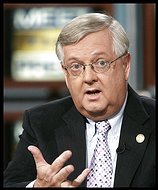
Weldon worked hard to represent his constituents. Especially the Eastern European and Russian ones.
Officials at the U.S. Embassy in Belgrade were surprised three years ago to be invited to a luncheon in honor of visiting Rep. Curt Weldon (R-Pa.), hosted by Bogoljub Karic, a wealthy Serbian businessman who had been barred from visiting or trading with the United States because of his close ties to former Yugoslav leader Slobodan Milosevic.
Weldon "was visiting solely because of Karic," whom he was trying to get off the U.S. blacklist, a former senior embassy official familiar with the visit concluded. "It seemed odd" at the time, because Karic had no obvious tie to Weldon's district outside Philadelphia, and Weldon should have known the embassy was shunning contacts with him, the official said.
What the embassy apparently did not know is that the Karic family that year signed a contract with Weldon's daughter, Karen, and a business partner that called for monthly payments of $20,000 for "management, government and public relations," according to a copy of the March 2003 contract. In all, the family paid Karen Weldon's firm $133,858 that year for efforts she undertook to set up a foundation for it.
Curt Weldon's visit and that deal are under investigation by the FBI, according to a law enforcement source familiar with the probe. His efforts to assist clients of his daughter's consulting firm in their dealings with the federal government are the focus of that probe, according to sources familiar with it . ...
Besides looking at Weldon's Karic connection, the FBI is examining the lawmaker's contacts with a Russian-managed oil and gas company, Itera International Energy Corp., the sources said. The company's offices in Jacksonville, Fla., were searched on Monday.
Itera spokesman Steve Koegler declined to answer questions yesterday, but released a statement saying that the government had expressed interest Monday in "any records or information Itera might have with respect to Itera's business relationship with Solutions Worldwide." The name of the firm that Karen Weldon operates with one of her father's close political supporters, Charles Sexton, is Solutions North America Inc.
Tuesday, October 17, 2006
Search Warrants Served In Weldon Case
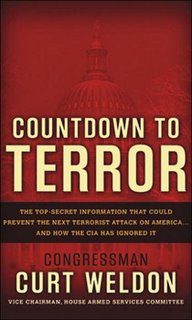
The noose seems to be tightening around Rep. Curt Weldon (R-PA).
MOVING SWIFTLY in a criminal investigation involving U.S. Rep. Curt Weldon, federal agents yesterday raided six locations in Philadelphia, in Delaware County and in Florida.
The probe apparently is focused on links between the congressman's official activities and clients of his daughter's lobbying firm, first reported in 2004 by the Los Angeles Times.
Weldon denied any wrongdoing by himself or his daughter.
Yesterday, the FBI carried away boxes of potential evidence from the homes of the two founders of the lobbying business - Karen Weldon, 32, who lives in Queen Village, and longtime Republican power broker Charles P. Sexton Jr., 70, who lives in Springfield, Delaware County.
Other warrants were served on the Media offices of the lobbying firm, North American Solutions Inc.; the Philadelphia office of attorney John J. Gallagher, a longtime friend of the Weldons who reportedly introduced Karen Weldon to one of her clients, a Russian aerospace firm; the Jacksonville offices of a Russian-based conglomerate known as Itera International Energy Corp., and a $7.5 million beachfront mansion in Ponte Vedra Beach, Fla., apparently owned by an Itera-related company.
The Republican congressman, already locked in the toughest re-election fight of his 20-year career in Washington, had previously brushed off questions about the L.A. Times disclosures, telling reporters that they'd been investigated and dismissed by the House Ethics Committee.
But the events of the last four days - the disclosure of the federal investigation by McClatchy Newspapers last Friday, and yesterday's sweeping search warrants - prompted Weldon to hold a 16-minute news conference late yesterday afternoon.
Weldon denied any wrongdoing by himself or his daughter, but refused to answer specific questions about services he reportedly performed for clients of his daughter's firm.
"I would absolutely never use my position to help anyone in an unusual way," Weldon said. "... My daughter doesn't need my help now, she never has, she's a very capable professional."
The congressman said his daughter did not intend to answer questions from the news media. Sexton did not return a call from the Daily News.
The L.A. Times reported in February 2004 that Weldon had gone to bat for at least three of the lobbying firm's clients - a Serbian family seeking U.S. visas in spite of ties to accused war criminal Slobodan Milosevic; a Russian aerospace manufacturer known as the Saratov Aviation Plant, for which Weldon pitched an idea to the U.S. Navy, and Itera, a company that obtained vast natural-gas fields in the breakup of the Soviet Union and was looking to expand its gas, timber and real-estate holdings in the U.S.
Monday, October 16, 2006
"Continuity Of Congress" By Secret List

There have been rumors that Dennis Hastert will not resign (if he does) until Congress returns from their recess. This is supposedly to assure that the presidential succession in case of an emergency -- with Speaker of the House following the Vice President -- is not disrupted.
Perhaps this is not necessary.
In a little-noticed action taken nearly four years ago, the House amended its rules dealing with the "continuity of Congress" in emergencies and the succession of speakers. The rule, cited recently in Roll Call, directs the speaker to "deliver to the Clerk a list of Members in the order in which each shall act as Speaker pro tempore . . . in the case of a vacancy in the office of Speaker."
Normally, "speaker pro tempore" is the title given for a few hours at a time to various members of the majority who preside over House sessions. But the rules revision made in January 2003, in response to worries about terrorist strikes that could wipe out large numbers of elected officials, appears to bestow upon a newly named replacement all the powers enjoyed by a full-time speaker elected by his peers.
That would include standing behind only the vice president in the line of presidential succession, said Sally Collins, spokeswoman for House administrators. But other House officials said it is extremely unlikely that a speaker pro tempore could assume the presidency before Congress would reconvene and elect a new speaker.
One thing is certain: The identity of the speaker-in-waiting is a closely held secret. Hastert's office declined to discuss the matter, citing security concerns, and the clerk's office confirmed only that Hastert's list is not made public.
Perhaps the biggest question, some lawyers say, is whether a House speaker -- full time or pro tempore -- can assume and keep the presidency under any circumstance. A statute, not the Constitution, lists the speaker's place in the line succession.
A case can be made that no one in Congress qualifies as an "officer" eligible to assume the presidency under Article II of the Constitution, said Neil Kinkopf, a professor of law at Georgia State University. The question may never be settled, he said, because the Supreme Court would take it up only if a speaker became president and someone challenged the action in court.
As for nightmarish constitutional what-ifs, Kinkopf said, "Imagine where the presidency falls not to the speaker, but to somebody on the speaker's secret list."
Sunday, October 15, 2006
Bush and Rove Are Certain That GOP Will Hold Congress
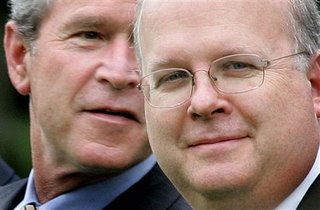
This sounds eerily similar to Bush's "Jeb tells me that he has this one in the bag" statement about the disputed Florida numbers on election night 2000.
Amid widespread panic in the Republican establishment about the coming midterm elections, there are two people whose confidence about GOP prospects strikes even their closest allies as almost inexplicably upbeat: President Bush and his top political adviser, Karl Rove.
Some Republicans on Capitol Hill are bracing for losses of 25 House seats or more. But party operatives say Rove is predicting that, at worst, Republicans will lose only 8 to 10 seats -- shy of the 15-seat threshold that would cede control to Democrats for the first time since the 1994 elections and probably hobble the balance of Bush's second term.
In the Senate, Rove and associates believe, a Democratic victory would require the opposition to "run the table," as one official put it, to pick up the necessary six seats -- a prospect the White House seems to regard as nearly inconceivable. ...
The question is whether this is a case of justified confidence -- based on Bush's and Rove's electoral record and knowledge of the money, technology and other assets at their command -- or of self-delusion. Even many Republicans suspect the latter. Three GOP strategists with close ties to the White House flatly predicted the loss of the House, though they would not do so on the record for fear of offending senior Bush aides.
Saturday, October 14, 2006
Rove's Office Considers Evangelicals "Nuts"
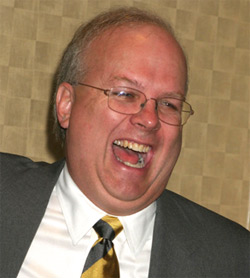
Rove's political genius is clearly showing here:
A new book by a former White House official says that President Bush's top political advisors privately ridiculed evangelical supporters as "nuts" and "goofy" while embracing them in public and using their votes to help win elections. ...
The assertions by David Kuo, a top official in the faith-based initiatives program, have rattled Republican strategists already struggling to persuade evangelical voters to turn out this fall for the GOP.
Some conservatives lamented Thursday that the book, "Tempting Faith: An Inside Story of Political Seduction," also comes in the midst of the scandal involving former Rep. Mark Foley, another threat to conservative turnout in competitive House and Senate races. ...
In the book, Kuo, who quit the White House in 2003, accuses Karl Rove's political staff of cynically hijacking the faith-based initiatives idea for electoral gain. It assails Bush for failing to live up to his promises of boosting the role of religious organizations in delivering social services.
White House strategists "knew 'the nuts' were politically invaluable, but that was the extent of their usefulness," Kuo writes, according to the cable channel MSNBC, which obtained an advance copy.
"Sadly, the political affairs folks complained most often and most loudly about how boorish many politically involved Christians were... National Christian leaders received hugs and smiles in person and then were dismissed behind their backs and described as 'ridiculous' and 'out of control.' "
Friday, October 13, 2006
Abramovian Nonprofit Skullduggery

Some big-time nonprofit groups are back in the news due to their business relationships they had with convicted lobbyist Jack Abramoff.
Five conservative nonprofit organizations, including one run by prominent Republican Grover Norquist, "appear to have perpetrated a fraud" on taxpayers by selling their clout to lobbyist Jack Abramoff, Senate investigators said in a report issued yesterday.
The report includes previously unreleased e-mails between the now-disgraced lobbyist and officers of the nonprofit groups, showing that Abramoff funneled money from his clients to the groups. In exchange, the groups, among other things, produced ostensibly independent newspaper op-ed columns or news releases that favored the clients' positions.
Officers of the groups "were generally available to carry out Mr. Abramoff's requests for help with his clients in exchange for cash payments," said the report, issued by the Senate Finance Committee. The report was written by the Democratic staff after a yearlong investigation and authorized by the Republican chairman, Sen. Charles E. Grassley (R-Iowa).
Abramoff has pleaded guilty to fraud and conspiracy and could go to prison as early as next month. Prosecution and defense lawyers jointly filed papers yesterday asking a judge to recommend that he be sent to a federal facility in Cumberland, Md., to make it easier for him to cooperate with the ongoing probe. The investigation has resulted in one conviction and seven guilty pleas -- including one from a lawmaker, Rep. Robert W. Ney (R-Ohio), who is to appear today before a federal judge in the District.
The Senate report released yesterday states that the nonprofit groups probably violated their tax-exempt status "by laundering payments and then disbursing funds at Mr. Abramoff's direction; taking payments in exchange for writing newspaper columns or press releases that put Mr. Abramoff's clients in a favorable light; introducing Mr. Abramoff's clients to government officials in exchange for payment; and agreeing to act as a front organization for congressional trips paid for by Mr. Abramoff's clients."
The report bolstered earlier revelations that Abramoff laundered money through the nonprofits to pay for congressional trips and paid Norquist to arrange meetings for Abramoff's clients with government officials including White House senior adviser Karl Rove.
The groups named in the report are Norquist's Americans for Tax Reform; the Council of Republicans for Environmental Advocacy, which was co-founded by Norquist and Gale Norton before she became secretary of the interior; Citizens Against Government Waste; the National Center for Public Policy Research, a spinoff of the Heritage Foundation; and Toward Tradition, a Seattle-based religious group founded by Rabbi Daniel Lapin.
E-mails released by the committee show that Abramoff, often with the knowledge of the groups' leaders, exploited the tax-exempt status and leveraged the stature of the organizations to build support among conservatives for legislation or government action sought by clients including Microsoft Corp., mutual fund company DH2 Inc., Primedia Inc.'s Channel One Network, and Brown-Forman, maker of Jack Daniel's whiskey. ...
The Abramoff scandal has bruised the image of Norquist, a friend of Abramoff's since their days in the College Republicans. Often consulted by Rove, Norquist for decades has convened a key Wednesday morning strategy session for conservative leaders, lobbyists and Republican lawmakers.
Abramoff traded on Norquist's cachet, at one point referring to him in an e-mail as a "hard-won asset" of his lobbying empire. In exchange for Norquist's opposition to taxes on Brown-Forman products, Norquist recommended that a $50,000 donation be made to Americans for Tax Reform, according to an Abramoff e-mail.
"What is most important, however, is that this matter is kept discreet," Abramoff wrote to a colleague at the Preston, Gates & Ellis law firm. "We do not want the opponents to think that we are trying to buy the taxpayer movement."
The e-mails show that Abramoff and Norquist explicitly discussed client donations to Norquist's group in exchange for Norquist's support. The group's advocacy "appears indistinguishable from lobbying undertaken by for-profit, taxable firms," the report said.
Among those who agreed to donate money for an opinion piece was DH2, which in 2004 pushed for tax breaks for its customers.
E-mails show that DH2 understood that Norquist's help came with a price tag. The tab was sent to DH2's managing director, Robert S. Rubin.
"I told Rubin he needs to round up some $$$ for ATR," wrote lobbyist Michael E. Williams to his boss, Abramoff.
"Get the money from Rubin in hand," Abramoff replied, "and then we'll call Grover."
How much, Williams asked.
"50K," Abramoff wrote.
Abramoff e-mailed Norquist on Feb. 10, 2004: "I have sent over a $50K contribution from DH2 (the mutual fund client). Any sense as to where we are on the op-ed placement?"
Replied Norquist: "The Wash Times told me they were running the piece. . . . I will nudge again."
The Washington Times has published about 50 Norquist op-eds since 1993 but apparently none on mutual funds.
Thursday, October 12, 2006
Investigation Into Cover-up Of Pagegate Proceeds
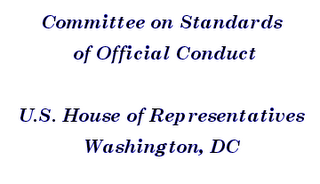
Here's the latest on the unfolding investigations in Washington into the cover-up of the Foley matter.
With House Speaker J. Dennis Hastert denying personal knowledge of former representative Mark Foley's activities, investigators for the House ethics committee are bearing down on three senior members of Hastert's staff to determine when they learned of Foley's actions and whether they passed on their knowledge to the speaker.
The three -- chief of staff Scott Palmer, deputy chief of staff Mike Stokke and counsel Ted Van Der Meid -- have formed a palace guard around Hastert (R-Ill.) for years, attaining great degrees of power and unusual autonomy to deal with matters of politics, policy and House operations. ...
Within Hastert's operation, some staff members appear to point accusingly at Van Der Meid, who is in charge of ethics matters and is widely believed to have steered Hastert wrong before.
Van Der Meid, a former chief Republican counsel for the House Committee on Standards of Official Conduct, helped engineer the failed effort to change GOP ethics rules to allow an indicted lawmaker to remain in the leadership. The power play was designed to keep then-House Majority Leader Tom DeLay (R-Tex.) at his post, but it backfired spectacularly, embarrassing many Republicans and leaving a blemish on Hastert's record.
One House leadership aide said Van Der Meid lacks the personal connections with the speaker that Palmer and Stokke have, making him the most vulnerable of the three.
The staff issue will be front and center today, as the ethics committee takes the testimony of Kirk Fordham, Foley's former chief of staff, who is to testify that in 2003 he alerted Palmer to Foley's behavior. A source with knowledge of the events said Fordham will detail repeated efforts by then-House Clerk Jeff Trandahl to raise alarms about Foley's interest in young pages, and Fordham's own confrontations with Foley. ...
Both Fordham and Trandahl decided that Fordham should call Palmer, according to the source. In a phone call with Palmer, Fordham expressed his concern about Foley's "over-friendliness" to pages, although Fordham did not specifically mention that Foley was seen outside the pages' dorm. Palmer said he would talk to Foley about it; two days later, Fordham checked in with Palmer. Palmer said that he spoke with Foley and that he told the speaker about it, the source said.
Palmer has said: "What Kirk Fordham said did not happen." ...
A current staff member who has corroborated Palmer's meeting with Foley has also offered to cooperate with investigators. ...
The speaker's own timeline points to Van Der Meid and Stokke as central players in the Foley matter. After Alexander's staff alerted a low-level Hastert aide in the fall of 2005, Stokke directed the information to Van Der Meid. Later that day, Stokke met with Alexander's chief of staff, then summoned Trandahl to the speaker's office. Later, Trandahl informed Van Der Meid that action had been taken to stop Foley's communications with the Louisiana youth.
A senior GOP aide, speaking on the condition of anonymity for fear of retribution, said it made little sense to have a political hand such as Stokke handle the Foley matter, a delicate issue involving personnel questions and possible legal violations.
"Did they make an affirmative decision to have the political guy work on this?" the GOP staffer asked. "It clearly was a bad damn idea."
Nowhere in the speaker's timeline is Palmer mentioned. But former leadership aides question how a powerful chief of staff could have been left out of such complicated deliberations and how they would have been kept from Hastert.
The latter point is especially true if Foley's behavior came to Palmer's attention in 2003, one former aide said. In recent months, as the House has become consumed in scandal and political trouble, Hastert has been less engaged in the day-to-day activities of the House, he said. That was not true in 2003, however, the former aide added.
Wednesday, October 11, 2006
Specter Staffer Under FBI Investigation
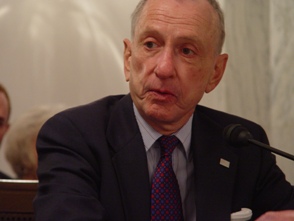
Arlen Specter is getting ahead of the news by putting out the story himself, as any political professional would be well advised to do:
The FBI is investigating whether a member of Sen. Arlen Specter's staff broke the law by helping her husband, a lobbyist, secure almost $50 million in Pentagon spending for his clients, the senator acknowledged Tuesday.
In an Aug. 21 letter, FBI official Joseph Persichini Jr. told Specter, R-Pa., that the bureau is investigating "allegations of possible criminal misconduct" by staff member Vicki Siegel Herson. Persichini also asked for a copy of a report summarizing the results of an investigation of Siegel and other Specter employees with relatives who are lobbyists. Specter's former chief of staff, William Reynolds, carried out the investigation.
Specter provided a copy of the FBI letter to USA TODAY and said his staff gave the FBI the report last month.
The federal probe stems from a February report by USA TODAY about Siegel. Specter helped direct $48.7 million in Pentagon spending over the past five years to clients of her lobbyist husband, Michael Herson.
Specter has acknowledged he used his position on the Senate Appropriations Committee to put special-interest language in Pentagon spending bills directing the money to clients of Herson's firm, American Defense International.
Specter says he didn't know of the link to Siegel, who was one of his top advisers on spending issues until last fall.
Specter says he did nothing wrong. "There's no violation of the (Senate) ethics rules," Specter, the chairman of the Senate Judiciary Committee, said Tuesday.
Siegel and Herson did not return messages seeking comment Tuesday evening.
Specter's investigation found that two lobbyists related to Specter staff members had lobbied the senator's office, and Specter inserted language directing a $200,000 grant to the client of one of them last year. That lobbyist, Eric Wallace, is the son of Specter's Scranton office chief, Andy Wallace.
USA TODAY reported on the findings April 25. That day, FBI agent Jennifer Bach reviewed Specter's personal financial disclosure statements, Senate records show. Specter said his family's assets are in a blind trust, and "I've taken every step to avoid problems."
After the first report about Siegel, Specter changed his office rules to ban contact with any lobbyists related to staff members. Specter also referred the matter to the Senate ethics committee, which has taken no action.
Tuesday, October 10, 2006
George Allen Stock Option Skullduggery?
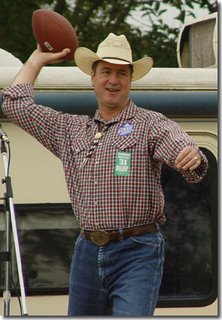
Another problem for Senator Allen?
Sen. George Allen did not disclose to Congress that he owned stock options in a Virginia high-tech company and has now requested an opinion from the Senate Ethics Committee about whether that failure violated Senate rules.
Allen (R-Va.) received options on 15,000 shares of stock in Commonwealth Biotechnologies Inc. after serving on its board of directors between the end of his term as governor and his election to the Senate. He disclosed the options before his first Senate term in 2001 but has not reported his continued ownership of them since, campaign officials said Monday. ...
Under terms of Allen's stock options, he can buy the Commonwealth shares at $7.50 each.
The company's stock closed at $2.58 per share Monday, making the options worthless today, but potentially valuable if the stock rises above $7.50. The Senate's disclosure instructions say that options that are not vested or are "contingent upon the occurrence of some future event" need not be disclosed. ...
Sheila Krumholz, acting executive director of the nonpartisan Center for Responsive Politics, said Allen's defense -- that the options were worthless -- should not excuse him from having to disclose that he owned them.
"It doesn't matter whether the exercise price is above or below the current stock price," she said. "What matters is you own it, you have it and at some point it may be worth money."
Krumholz said that public disclosure about ownership of such stock options helps voters decide whether lawmakers are making policy decisions that also enrich themselves. There is no evidence that Allen did anything to boost the stock price of Commonwealth.
"If it is worthless today, and then worth millions next year, then it's of enormous interest whether the representative or senator made decisions based on their potential financial gain," Krumholz said.
Allen's staff also acknowledged Monday that the senator had written a letter on behalf of another Virginia company in which he owned stock.
In the December 2001 letter, furnished by Allen campaign officials, the senator urged the Army to expedite a decision regarding a contract with Xybernaut, another Virginia high-tech company. Allen also has served on Xybernaut's board.
"Your immediate attention and expeditious assistance with the requests and concerns expressed in this case would be greatly appreciated," Allen wrote in the five-sentence letter to Army officials as Xybernaut vied for a Army with the service.
Campaign officials said that the request by Xybernaut was turned down and that Allen's only intervention was in a form letter. The office provided copies of similar letters written on behalf of other Virginia companies that contained the exact language. The AP also first reported about the Xybernaut letter.
This is not the first time Allen has faced inquiries about his corporate dealings.
In 2001, news reports surfaced that Allen had reported a $279,000, one-time payment from stock options he received as an advisory board member at Com-Net Ericsson, a high-tech company in Lynchburg, Va.
Allen joined the Com-Net board in 2000 after helping the company expand while governor.
The payment was made after Allen received a ruling from the Senate Ethics Committee that the compensation did not violate Senate rules.
Monday, October 09, 2006
Did Palmer Talk To Hastert About Foley?

Speaker Hastert's Chief of Staff Scott Palmer has been quoted in the press as not having been an interlocutor between Kirk Fordham--the bearer of bad news about Rep. Foley's behavior--and the Speaker himself.
Fordham is telling another story to federal investigators:
This incident (Foley's drunken appearance at the Page dormitory) prompted Fordham to go to Scott Palmer, Hastert's chief of staff, and tell him about Foley's behavior. Fordham called Palmer and told him that he wanted to speak with him privately, the source says. The two men met in a small office on Capitol Hill. (Palmer says the meeting never took place.)
Fordham did not tell Palmer about Foley's attempt to enter the pages' dormitory, but rather that he was generally concerned about his boss's excessive friendliness to the pages, according to the source. Palmer expressed surprise and concern, the source says, and wondered what this could mean to Foley's political future. Why would he endanger his career with such conduct?
Palmer assured Fordham that he would talk to Foley. A day or two later, Fordham called Palmer to ask what happened. Palmer told him that he "dealt with it" by talking to Foley and that he "informed the Speaker," according to the source familiar with Fordham's account. Months later Fordham had an awkward conversation with Foley in which his boss indicated that he had spoken to Palmer.
Saturday, October 07, 2006
Hastert's Chief of Staff In Spotlight
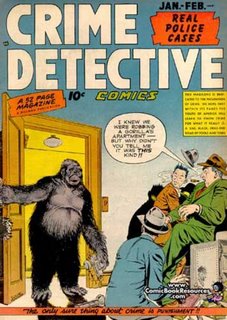
People are saying that any paperwork indicating when the House leadership learned about the activities of Mark Foley will be the determining factor of this scandal.
Instead of contemporaneous documentation, it appears that the critical paperwork may turn out to be the FBI interviews that will be taking place with the people knowledgeable about how the facts were learned and handled once they became known.
House Speaker J. Dennis Hastert's chief of staff confronted then-Rep. Mark Foley about his inappropriate social contact with male pages well before the speaker said aides in his office took any action, a current congressional staff member with personal knowledge of Foley and his behavior with pages said yesterday.
The staff member said Hastert's chief of staff, Scott Palmer, met with the Florida Republican at the Capitol to discuss complaints about Foley's behavior toward pages. The alleged meeting occurred long before Hastert says aides in his office dispatched Rep. John M. Shimkus (R-Ill.) and the clerk of the House in November 2005 to confront Foley about troubling e-mails he had sent to a Louisiana boy.
The staff member's account buttresses the position of Foley's onetime chief of staff, Kirk Fordham, who said earlier this week that he had appealed to Palmer in 2003 or earlier to intervene, after Fordham's own efforts to stop Foley's behavior had failed. Fordham said Foley and Palmer, one of the most powerful figures in the House of Representatives, met within days to discuss the allegations.
Palmer said this week that the meeting Fordham described "did not happen." Timothy J. Heaphy, Fordham's attorney, said yesterday that Fordham is prepared to testify under oath that he had arranged the meeting and that both Foley and Palmer told him the meeting had taken place. Fordham spent more than three hours with the FBI on Thursday, and Heaphy said that on Friday he contacted the House Committee on Standards of Official Conduct to offer his client's cooperation. ...
On Wednesday night, Palmer was described as highly emotional while aides sifted through e-mails and files to determine whether he had ever spoken to Fordham. Several people who spoke with Palmer said the chief of staff was emphatic in denying that he knew anything about Foley's questionable contacts with young male pages.
Palmer, who shares a townhouse with Hastert when they are in town, is more powerful than all but a few House members. Members know that he speaks for Hastert.
Friday, October 06, 2006
Washington Loves A Scandal
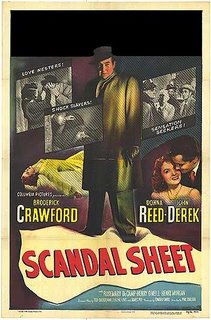
The subpoenas are going out, and the focus is on the cover-up:
The (House ethics committee) approved nearly four dozen subpoenas for documents and testimony from House members, officers and aides. Its leaders said they plan to complete the inquiry in a matter of weeks, but not necessarily before the Nov. 7 congressional elections. ...
The committee's inquiry will proceed in tandem with investigations by the FBI and Florida officials. Unlike those agencies, the ethics committee has no jurisdiction over Foley, who resigned last week as ABC News was publishing sexually graphic electronic messages between him and teenage former congressional pages. Hastings said his committee will focus on the "conduct of House members, officers and staff related to information concerning improper conduct involving members and current and former pages." ...
Kirk Fordham, Foley's former chief of staff, said this week that he repeatedly alerted Hastert's staff in 2003 to complaints that the Florida lawmaker was showing inappropriate interest in male pages...
Some Republicans said they are most concerned about Fordham's assertions. Scott Palmer, the speaker's top aide, has denied the allegations and spent much of Wednesday night rummaging through old e-mails and files to determine whether he ever corresponded with Fordham, a source close to Hastert said. Palmer, who was described as very emotional, told Hastert that Fordham's assertions are false, the source said.
Hastert's office has been on edge. Deputy Chief of Staff Mike Stokke, who handles politics for the speaker, has offered to resign, two sources close to Hastert said, and several aides have expressed frustration that Ted Van Der Meid, the top counsel in the office, did not do a better job monitoring the Foley situation. Hastert did not accept Stokke's resignation offer, the source said.
No sale. The whole reason businesses and other important operations maintain in-house counsel is precisely to navigate ambiguous terrain to avoid serious problems. The Foley issue wasn't even ambiguous.
The guy currently in the hot seat, Speaker of the House Dennis Hastert, is having problems relating truthful versions of his story:
Mr. Hastert also said Thursday that the head of the board, Representative John Shimkus, Republican of Illinois, had confronted Mr. Foley over the Louisiana e-mail and "asked him if there were any other messages."
"He said no," Mr. Hastert said.
On Monday, Mr. Hastert said he did not know whether Mr. Shimkus had pressed Mr. Foley on messages to others. Mr. Shimkus, in an interview on Wednesday with The Chicago Tribune, said he did not ask Mr. Foley about other messages.
Another plain gaffe by Hastert made it look like the GOP is angry that the Foley matter became public. That would presumably include the Florida congressman's resulting departure from the House.
Comments that Hastert made in a Tribune interview suggesting the scandal had been orchestrated by ABC News, Democratic political operatives aligned with the Clinton White House and liberal activist George Soros were considered a serious misstep in national Republican circles, an official said. Senior Republican officials contacted Hastert's office before his news conference Thursday to urge that he not repeat the charges and he backed away from them in his press conference.
"The Chicago Tribune interview last night—the George Soros defense—was viewed as incredibly inept," a national Republican official said. "It could have been written by [comedian] Jon Stewart."
The Republican Party, as might be expected, are circling the wagons at this point:
Republicans are calculating that the smartest way to survive the Mark Foley sex scandal is to rally around House Speaker J. Dennis Hastert (R-Ill.) and hope that no new evidence surfaces before Election Day that shows GOP leaders could have done more to prevent the congressman from preying on young male pages, according to several GOP lawmakers and strategists.
The White House and top House Republicans remain deeply nervous that the scandal will hurt them politically, and that additional information will come out contradicting statements by Hastert and others that they were unaware of Foley's sexual messages to underage boys, the lawmakers and officials said.
For now, they said, it would be politically disastrous for Republicans to oust Hastert because it would be viewed as akin to a public admission of guilt in the scandal, as well as a pre-election victory that would buoy Democrats and help their turnout efforts. ...
Several GOP lawmakers in tough races said voters are not reacting as harshly to the scandal as they first feared, buying Hastert even more room to save his job. Still, lawmakers are privately furious with how Hastert and other leaders have handled the scandal. It has created tension among GOP leaders who have sometimes viewed each other suspiciously since House Majority Leader John A. Boehner (R-Ohio) took over after the resignation of Tom DeLay (R-Tex.). And many expect that the worst is still to come.
Dragging this thing out is an ill-advised gamble by the GOP.
There must be a good reason for keeping the matter open in front of the voting public this close to a tight election.
The reason might be that Hastert knows where other party skeletons are buried, and is playing his cards accordingly.
That might explain why a week into a sex scandal involving teenage House pages, President Bush called House Speaker Dennis Hastert on Thursday to thank the embattled Republican leader for how he has handled the situation.
Thursday, October 05, 2006
CREW Wants Answers From FBI

The whole Foley Scandal has been replete with people not having their stories straight.
Now even federal investigators seem to be working from more than one playbook:
Citizens for Responsibility and Ethics in Washington (CREW) wrote to the Department of Justice (DOJ) Inspector General's (I.G.) office today to ask for an investigation into why the Federal Bureau of Investigation (FBI) has fabricated and disseminated a cover-up story as to why it never investigated the Foley emails sent to it by CREW.
CBS News has reported that according to the FBI when CREW gave the Bureau the original set of emails from Rep. Mark Foley to a former House page, they were "Heavily redacted." The FBI is also claiming that it came back to CREW and asked for more information so that it could follow up, but that CREW refused to provide anything further. Reporters from several other news organizations have repeated this allegation. The FBI is lying.
On Monday, October 2, CREW sent a letter to the DOJ I.G.'s office, attaching exact copies of the emails CREW had sent to the FBI on July 21, 2006. Both the former page's name and the person to whom the page forwarded Rep. Foley's emails were clearly visible. Moreover, after CREW sent the emails to the FBI, CREW's only subsequent contact with the Bureau was one telephone call from the special agent to whom CREW had sent the material confirming that the emails were from Rep. Foley. CREW had no further contact with the FBI.
In contrast with this new explanation for failing to investigate the Foley matter, The Washington Post has reported that an unnamed FBI official stated that the Bureau decided not to investigate after concluding that the emails "did not rise to the level of criminal activity."
Melanie Sloan, CREW's executive director said today, "the FBI cannot have it both ways; either it failed to investigate the Foley emails because they did not rise to a level of criminal activity or because it did not have adequate information to do so. Pick one.
"Attorney General Gonzales has told the public repeatedly that the investigation and prosecution of those who sexually exploit children is a top priority. We are outraged that the FBI failed to investigate Rep. Foley and is now blaming others for its inaction.
"It is time for all of those who had knowledge about Rep. Foley's conduct to step up and take responsibility for leaving a sexual predator on the loose."
h/t: Atrios
Wednesday, October 04, 2006
Did Gonzales Participate in Cover-up of Foley's Activities?
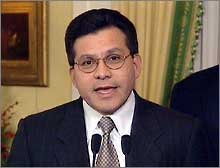
Here's an interesting take on the timing and motivation of the leak that triggered the GOP House leadership scandal.
From Wayne Madsen:
WMR has learned from informed sources in the Justice Department that the salacious e-mails from Rep. Mark Foley were leaked to ABC News by career Justice Department prosecutors and FBI agents who are incensed that Attorneys General John Ashcroft and Alberto Gonzales covered up the House page scandal for political reasons. The back story of Pagegate is that there was a criminal conspiracy by the top political leadership of the Justice Department to cover up the predatory activities of Foley and other GOP members of Congress since at least 2003 and, likely, as early as 2001.
Other informed sources in the nation's capital report that Pagegate will soon implicate a number of GOP staffers in both the House and the Senate who intimidated and pressured male pages into inappropriate sexual relationships. One source confided that the staff members' contact with pages was "more egregious" than Foley's behavior.
The Pagegate scandal also involves senior officials of the Republican National Committee, located near the House Office Buildings, according to our Capitol Hill sources.
The bottom line is that the GOP is facing its worst political scandal since Watergate and the White House, already under assault from the revelations in Bob Woodward's insider account of the Bush presidency and the Iraq war, has told GOP members of Congress that they are on their own as far as Pagegate damage control is concerned.
Monday, October 02, 2006
"No Child Left Behind"

If the feds look closely enough, they may uncover the culture of catamite-keeping that is rumored to distinguish the GOP in Washington from their Democratic colleagues.
The FBI announced last night that it is looking into whether former representative Mark Foley (R-Fla.) broke federal law by sending inappropriate e-mails and instant messages to teenage House pages. ...
Foley, 52, abruptly resigned Friday, and Democrats have since been hammering Hastert and other GOP leaders. They have accused Republicans of covering up the matter and allowing Foley to remain as co-chair of the Congressional Missing and Exploited Children's Caucus instead of launching an inquiry and possibly uncovering the raunchier communications.
As the scandal broke, Hastert contended he learned of concerns about Foley only last week. But after Rep. Thomas M. Reynolds (R-N.Y.) said Saturday that he had notified Hastert months ago of Foley's e-mails to a 16-year-old boy, the speaker did not dispute his colleague, and Hastert's office acknowledged that some aides knew last year that Foley had been ordered to cease contact with the youth. ...
Also yesterday, a former House page said that at a 2003 page reunion, he saw sexually suggestive e-mails Foley had sent to another former page. Patrick McDonald, 21, now a senior at Ohio State University, said he eventually learned of "three or four" pages from his 2001-2002 class who were sent such messages. ...
FBI Special Agent Richard Kolko declined to elaborate on his announcement of the agency's investigation of Foley. A law enforcement official who requested anonymity so he could discuss an ongoing case said the probe will be handled by the FBI's Cyber Division, and could involve agents from the Washington or Miami field offices. ...
Yesterday, Democrats kept up the pressure. Pelosi applauded the FBI announcement and called on the Republican leadership to quickly investigate "the cover up of Mr. Foley's behavior."
And Senate Minority Leader Harry M. Reid (D-Nev.) said the allegations against Foley "are repugnant, but equally as bad is the possibility that Republican leaders in the House of Representatives knew there was a problem and ignored it to preserve a congressional seat this election year."


